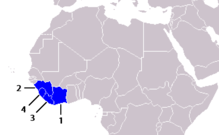Mano River Union
The Mano River Union (MRU) is an international association initially established between Liberia and Sierra Leone by the 3 October 1971 Mano River Declaration.[1] It is named for the Mano River which begins in the Guinea highlands and forms a border between Liberia and Sierra Leone. On 25 October 1980, Guinea joined the union.[2]

The goal of the Union was to "accelerate the economic growth, social progress and cultural advancement of our two countries ... by active collaboration and mutual assistance in matters of common interest in economic, social, technical, scientific and administrative fields".[1] However, due to internal conflicts within the two original MRU countries (the Sierra Leone Civil War [1991-2002] and the First [1989-1997] and Second Liberian Civil Wars [1999-2003]), these objectives could not be achieved.[3] The staff numbered 600 in 1986, but was down to 300 in 1993, then to 120, and 48 in 2000.[4]
On 20 May 2004, the Union was reactivated at a summit of the three leaders of the Mano River Union states: Presidents Lansana Conté of Guinea, Ahmad Tejan Kabbah of Sierra Leone and Chairman Gyude Bryant of Liberia. On 15 May 2008, Cote d'Ivoire agreed to join the union.[2]
Organizational structure
The MRU is run by a secretariat, headed by a Secretary-General. When Secretary-General Habib Diallo was killed in a car crash in 2011,[5] his successor was the first woman to hold that office: Dr Saran Daraba Kaba.[6] The Mano River Union Secretariat is based in Freetown, Sierra Leone,[4] with offices in Conakry, Guinea and Monrovia, Liberia.[3] In April 2016 the Union announced plans to form a Mano River Union Parliament, where legislators from the four member states will work to coordinate national legislation on matters of regional importance.[7]
Secretaries-General of the MRU
- Cyril Bright, Liberia (1974-1978)
- Ernest Eastman, Liberia (1978-1983)
- Augustus F. Caine, Liberia (1983-1987)
- Dr Abdoulaye Diallo, Guinea (1988-2005)
- Abraham Boure, Guinea (2007-2010)
- Habib Diallo, Guinea (2010-2011)
- Dr Hadja Saran Daraba Kaba, Guinea (2011-2017)
- Medina Wesseh, Liberia (2017-)
References
- "No. 13608 (Mano River Declaration)" (PDF). World Bank.
- "MANO River Union Capacity Building and Technical Assistance for Institutional Strengthening". African Development Bank Group.
- Nelson, Sue; Bassene, Mathias (June 2003). "Mano River Union Conflict Assessment and Peacebuilding Results Framework" (PDF). United States Agency for International Development.
- "Consultancy report on the revitalization of the Mano River Union Secretariat". United Nations Economic Commission for Africa. December 2000.
- Mehler, Andreas; Melber, Henning; Walraven, Klaas van (September 29, 2012). Africa Yearbook Volume 8: Politics, Economy and Society South of the Sahara in 2011. BRILL. p. 111. ISBN 9789004241787.
- "Executives". Mano River Union.
- "Mano River Union Countries to Establish Legislative Body". Front Page Africa. 19 April 2016. Retrieved 30 December 2017.